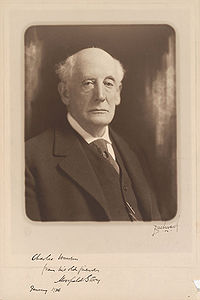- Moorfield Storey
-
Moorfield Storey (March 19, 1845 - October 24, 1929) was an American lawyer, publicist, and civil rights leader. According to Storey's biographer, William B. Hixson, Jr., he had a worldview that embodied "pacifism, anti-imperialism, and racial egalitarianism fully as much as it did laissez-faire and moral tone in government"[citation needed]
Contents
Biography
Early life
Storey's family was descended from the earliest Puritan settlers and had close connections with the abolitionist movement. He was born in Roxbury, Massachusetts, and arrived in Northeast Harbor after the Civil War, building a house there. He graduated at Harvard in 1866, studied at Harvard Law School, and in 1869 was admitted to the bar. In 1887 he built a house on Great Cranberry Island.
Career
In 1867-69, Storey was private secretary to Senator Charles Sumner. During his tenure, he initially supported the removal of President Andrew Johnson from office but soon became disgusted by the corruption and opportunism of politicians on both sides. He began the practice of his profession in Boston, and was a well-known person in the "Mugwump" movement of 1884.
Storey went on to have a distinguished law practice in Boston and was elected president of the American Bar Association in 1896. He was an active supporter of Grover Cleveland. As a strong believer in the gold standard, freedom of contract, and property rights, he could not abide the candidacy of William Jennings Bryan and supported the National Democratic Party (United States) (Gold Democrats) third ticket in 1896.[1]
Storey spoke at the first anti-imperialist mass meeting in Boston in June 1898, was a vice president of the New England Anti-Imperialist League. In addition, he wrote a book brief for the Lodge Committee summarizing the war crimes of the Philippine-American War. From 1905 until its dissolution in 1921, he was president of the national Anti-Imperialist League.
Congressional campaign
Late in the campaign of 1900, Storey seriously pondered running for president on a third party ticket but decided against it because it was impractical. Instead, he ran a losing, but spirited and high profile, campaign for Congress as an independent anti-imperialist candidate. Other planks in his platform included support for the gold standard and free trade.
Champion of civil rights
Storey consistently and aggressively championed civil rights not only for blacks but also for American Indians and immigrants (He opposed immigration restriction.). "When the white man governs himself, that is self-government," he declared, "but when he governs himself and also governs another man, that is more than self-government–that is despotism.".[1]
Storey was the first president of the National Association for the Advancement of Colored People (NAACP) from 1909 until his death in 1929. [2] He played a critical role in several important NAACP victories. Most notably, in 1917, he was lead counsel before the Supreme Court in Buchanan v. Warley. In that case, the Court unanimously overturned a Louisville law that forcibly segregated blacks by city blocks. The Court's opinion reflected the jurisprudence of property rights and freedom of contract as embodied in the earlier precedent it established in Lochner v. New York.
Later life
In the 1920s, Storey served as the chairperson of the Haiti-Santo Domingo Independence Society and on the advisory committee of the American Fund for Public Service Committee on American Imperialism.
Legacy
Damon W. Root touted him as an historical role model for libertarian Democrats in a 2007 article for Reason Magazine.[3]
Bibliography
- Charles Sumner (1900) in "American Statesmen Series."
- The Reform of Legal Procedure (1911).
- Ebenezer Rockwood Hoar, a Memoir (1911), with E. E. Emerson.
- Problems of To-Day (1920), the E. L. Godkin Lectures delivered at Harvard, March 1920.
Notes
- ^ a b David T. Beito and Linda Royster Beito, "Gold Democrats and the Decline of Classical Liberalism, 1896-1900," Independent Review 4 (Spring 2000), 555-75
- ^ Bliss Perry, "Moorfield Storey as a Man," The Crisis, May 1930, pp. 156-57.
- ^ Root, Damon W. (December 2007). "The Party of Jefferson: What the Democrats can learn from a dead libertarian lawyer". Reason Magazine. http://www.reason.com/news/show/123020.html.
References
- William B. Hixson Jr., Moorfield Storey and the Abolitionist Tradition (1972).
National Association for the Advancement of Colored People Leaders Presidents/CEOs
(executive secretaries 1910–77;
executive directors 1977–96)Frances Blascoer (1910–11) · Mary White Ovington (1911–12) · Mary Childs Nerney (1912–16) · Mary White Ovington (1916) · Royall Freeman Nash (1916–17) · James Weldon Johnson (1917–18) · John R. Shillady (1918–20) · James Weldon Johnson (1920–31) · Walter Francis White (1931–55) · Roy Wilkins (1955–77) · Benjamin Hooks (1977–92) · Benjamin Chavis Muhammad (1993–94) · Earl Shinhoster (1994–96) · Kweisi Mfume (1996–2004) · Dennis Courtland Hayes (2005) · Bruce S. Gordon (2005–7) · Dennis Courtland Hayes (2007–8) · Benjamin Jealous (2007–present)
Elected presidents
(1909–96, abolished)Moorfield Storey (1909–29) · Joel Elias Spingarn (1930–39) · Arthur B. Spingarn (1940–65) · Kivie Kaplan (1966–75) · William Montague Cobb (1976–82) · James Kemp (1983) · Enolia McMillan (1984–90) · Hazel N. Dukes (1990–92) · Rupert Richardson (1992–96)ChairpersonsWilliam English Walling (1910–11) · Oswald Garrison Villard (1911–14) · Joel Elias Spingarn (1914–19) · Mary White Ovington (1919–34) · Louis T. Wright (1934–53) · Channing Heggie Tobias (1953–60) · Robert C. Weaver (1960–61) · Stephen Gill Spottswood (1961–75) · Margaret Bush Wilson (1975–83) · Kelly Alexander (1983–84) · William Gibson (1985–95) · Myrlie Evers-Williams (1995–98) · Julian Bond (1998–2010) · Roslyn Brock (2010–present)See also NAACP Theatre Awards · NAACP Image Awards · NAACP Legal Defense and Educational Fund · NAACP Youth Council · Afro-Academic, Cultural, Technological and Scientific Olympics · Spingarn Medal · Niagara Movement · National Negro Committee · The CrisisCategories:- 1845 births
- 1929 deaths
- American activists
- American biographers
- American civil rights lawyers
- American legal writers
- Harvard Law School alumni
- Harvard University alumni
- Massachusetts lawyers
- National Association for the Advancement of Colored People
- Presidents of the American Bar Association
- National Democratic Party (United States) politicians
Wikimedia Foundation. 2010.

